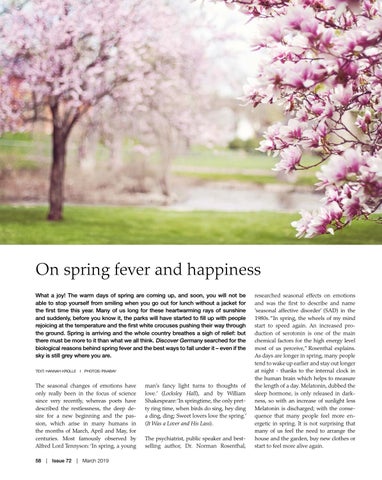Discover Germany | Culture Feature | Happiness Researcher – Spring Season Affecting Emotions
On spring fever and happiness What a joy! The warm days of spring are coming up, and soon, you will not be able to stop yourself from smiling when you go out for lunch without a jacket for the first time this year. Many of us long for these heartwarming rays of sunshine and suddenly, before you know it, the parks will have started to fill up with people rejoicing at the temperature and the first white crocuses pushing their way through the ground. Spring is arriving and the whole country breathes a sigh of relief: but there must be more to it than what we all think. Discover Germany searched for the biological reasons behind spring fever and the best ways to fall under it – even if the sky is still grey where you are. TEXT: HANNAH KROLLE I PHOTOS: PIXABAY
The seasonal changes of emotions have only really been in the focus of science since very recently, whereas poets have described the restlessness, the deep desire for a new beginning and the passion, which arise in many humans in the months of March, April and May, for centuries. Most famously observed by Alfred Lord Tennyson: ‘In spring, a young 58 | Issue 72 | March 2019
man’s fancy light turns to thoughts of love.’ (Locksley Hall), and by William Shakespeare: ‘In springtime, the only pretty ring time, when birds do sing, hey ding a ding, ding; Sweet lovers love the spring.’ (It Was a Lover and His Lass). The psychiatrist, public speaker and bestselling author, Dr. Norman Rosenthal,
researched seasonal effects on emotions and was the first to describe and name ’seasonal affective disorder’ (SAD) in the 1980s. “In spring, the wheels of my mind start to speed again. An increased production of serotonin is one of the main chemical factors for the high energy level most of us perceive,” Rosenthal explains. As days are longer in spring, many people tend to wake up earlier and stay out longer at night - thanks to the internal clock in the human brain which helps to measure the length of a day. Melatonin, dubbed the sleep hormone, is only released in darkness, so with an increase of sunlight less Melatonin is discharged; with the consequence that many people feel more energetic in spring. It is not surprising that many of us feel the need to arrange the house and the garden, buy new clothes or start to feel more alive again.
